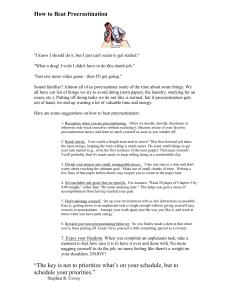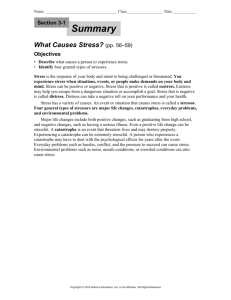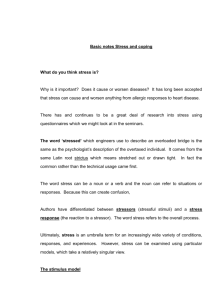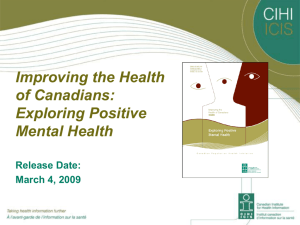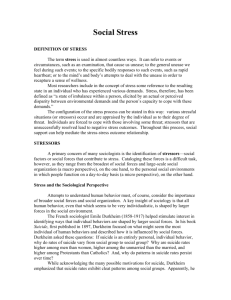Stress Management
advertisement
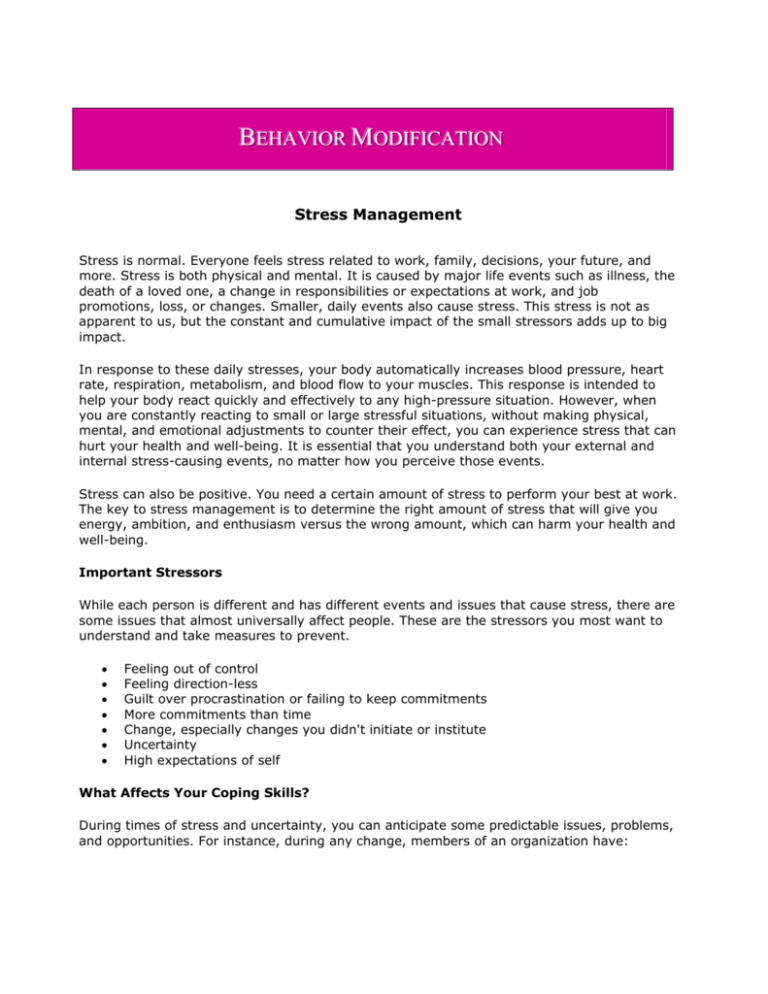
B BEEHHAAVVIIOORR M MOODDIIFFIICCAATTIIOONN Stress Management Stress is normal. Everyone feels stress related to work, family, decisions, your future, and more. Stress is both physical and mental. It is caused by major life events such as illness, the death of a loved one, a change in responsibilities or expectations at work, and job promotions, loss, or changes. Smaller, daily events also cause stress. This stress is not as apparent to us, but the constant and cumulative impact of the small stressors adds up to big impact. In response to these daily stresses, your body automatically increases blood pressure, heart rate, respiration, metabolism, and blood flow to your muscles. This response is intended to help your body react quickly and effectively to any high-pressure situation. However, when you are constantly reacting to small or large stressful situations, without making physical, mental, and emotional adjustments to counter their effect, you can experience stress that can hurt your health and well-being. It is essential that you understand both your external and internal stress-causing events, no matter how you perceive those events. Stress can also be positive. You need a certain amount of stress to perform your best at work. The key to stress management is to determine the right amount of stress that will give you energy, ambition, and enthusiasm versus the wrong amount, which can harm your health and well-being. Important Stressors While each person is different and has different events and issues that cause stress, there are some issues that almost universally affect people. These are the stressors you most want to understand and take measures to prevent. • • • • • • • Feeling out of control Feeling direction-less Guilt over procrastination or failing to keep commitments More commitments than time Change, especially changes you didn't initiate or institute Uncertainty High expectations of self What Affects Your Coping Skills? During times of stress and uncertainty, you can anticipate some predictable issues, problems, and opportunities. For instance, during any change, members of an organization have: • • • • • Different ways of regarding change. Some people have difficulty accepting and adjusting to change and uncertainty; others will relish the changes and view them as great opportunities. Some people initiate change; others prefer the status quo. Different amounts of experience and practice in stress management and change management. (What is devastating to one individual may excite another or only mildly irritate a third person.) Theoretically, people become better at managing change with experience. Some people need to "talk it out." Others suffer silently. Some find relief in complaining. Some talk and talk and talk, but are really supportive of the change. Others find ways to sabotage changes and undermine efforts to move forward. Different levels of stress and change occurring in other areas of their lives. During change, people will experience different amounts of impact from the current changes and stress producing situations. The will also experience different amounts and types of support from their spouse, significant other, friends, supervisor, and coworkers. More About What Affects Your Coping Skills All of these and other issues impact your ability to manage workplace stress and change, to continue to function productively. It is important to recognize that people who are experiencing serious stress and change may not be capable of performing exactly as they have in the past. Stress can cause physical, emotional, and behavioral problems, which can affect your health, energy, well-being, mental alertness, and personal and professional relationships. It can also cause defensiveness, lack of motivation, difficulty concentrating, accidents, reduced productivity, and interpersonal conflict. Too much stress can cause minor problems such as sleep-loss, irritability, backaches, or headaches, and can also contribute to potentially lifethreatening diseases such as high blood pressure and heart disease. During stressful times or situations, people often blame themselves for being weak or for their inability "to handle it." Often managers in organizations do not understand the normal progression of change or stress-producing situations and they expect an immediate return to total productivity after a stressful event. People have deep attachments to their work groups, organizational structures, personal responsibilities, and ways of accomplishing work. When any of these are disturbed, whether by personal choice or through an organizational process from which they may feel quite removed and uninvolved, a transition period occurs. During this transition, people can expect to experience a period of letting go of the old ways as they begin moving toward and integrating the new. The following suggestions will help you manage the stress you experience at work. Managing stress well is not easy and it takes time and practice. Developing coping skills is important for your overall health and well-being, however. These are in no particular order. Think about your own situation and tendencies to select your coping strategies. Control, time allocation, and goals. Set realistic goals and time frames for yourself. Remember the Alice in Wonderland Syndrome from the book Alice’s Adventures in Wonderland by Lewis Carroll. Alice is walking in the woods. She comes to a fork in the road. Not knowing which way to go, she asks the Cheshire Cat: “Would you tell me, please, which way I ought to go from here?” “That depends a good deal on where you want to get to,” said the cat. “I don’t much care where,” said Alice. “Then it doesn’t matter,” said the cat. Do you feel this way some days? Setting realistic goals for your day and year helps you feel directed and in control. Goals give you a yardstick against which you can measure every time commitment. Scheduling more than you can handle is a great stressor. Not only are you stressed trying to handle your commitments, you are stressed just thinking about them. If you are experiencing overload with some activities, learn to say, “no!” Eliminate any activities, which you don’t have to do. Carefully consider any time-based commitment you make. Use an electronic planner to schedule each goal and activity you commit to accomplish, not just your appointments. If that report will take two hours to write, schedule the two hours just as you would a meeting. If reading and responding to email takes a half hour per day, schedule the half hour. Reconsider all meetings. Why hold meetings in the first place? An effective meeting serves an essential purpose—it is an opportunity to share information and/ or to solve a critical problem. Meetings should only be held when interaction is required. Meetings can work to your advantage, or they can weaken your effectiveness at work. If much of your time is spent attending ineffective, time-wasting meetings, you are limiting your ability to accomplish important objectives at work. The Wall Street Journal, quoted a study that estimated American managers could save 80% of the time they currently waste in meetings if they did two things: start and end meetings on time and follow an agenda. You can’t be all things to all people – control your time. Something has to give. Make time for the most important commitments and take time to figure out what these are. Time management is a systematic approach to the time of your life applied consistently. The basis of time management is the ability to control events. A study was done some years ago that revealed symphony conductors live the longest of any professionals. Looking into this longevity, researchers concluded that in no other occupation do people have such complete control over existing events. In his book, Time Power, Dr. Charles Hobbes suggests that there are five categories of events: • • • • • Events Events Events Events Events you you you you you think think think think think you you you you you cannot control, and you can’t. cannot control, but you can. can control, but you can’t. can control, but you don’t. can control, and you can. There are two major issues about control: • The first is that each of us is really in control and in charge of more events than we generally like to acknowledge. • The second is that some things are uncontrollable. Trying to control uncontrollables is a key cause of stress and unhappiness. With the competing demands that exist for your time, you probably feel as if much of your day is not in your control. Feeling not in control is the enemy of time management. Feeling not in control is one of the major causes of stress in our daily lives, too. Make time decisions based on analysis. Take a look at how you currently divide your time. Do you get the little, unimportant things completed first because they are easy and their completion makes you feel good? Or, do you focus your efforts on the things that will really make a difference for your organization and your life. Events and activities fall into one of four categories. You need to spend the majority of your time on items that fall in the last two categories. • • • • Not Urgent and Not Important Urgent but Not Important Not Urgent but Important Urgent and Important Manage procrastination. If you are like most people, you procrastinate for three reasons. You don’t know how to do the task, you don’t like to do the task, or you feel indecisive about how to approach the task. Deal with procrastination by breaking the large project into as many small, manageable, instant tasks as possible. Make a written list of every task. List the small tasks on your daily, prioritized To Do List. Reward yourself upon completion. If you do procrastinate, you’ll find that the task gets bigger and bigger and more insurmountable in your own mind. Just start. These tips for managing stress and change will help you change your actions and your outlook. Best wishes as you implement these ideas. Live a great life. Source: Susan M. Heathfield, human resources consultant
